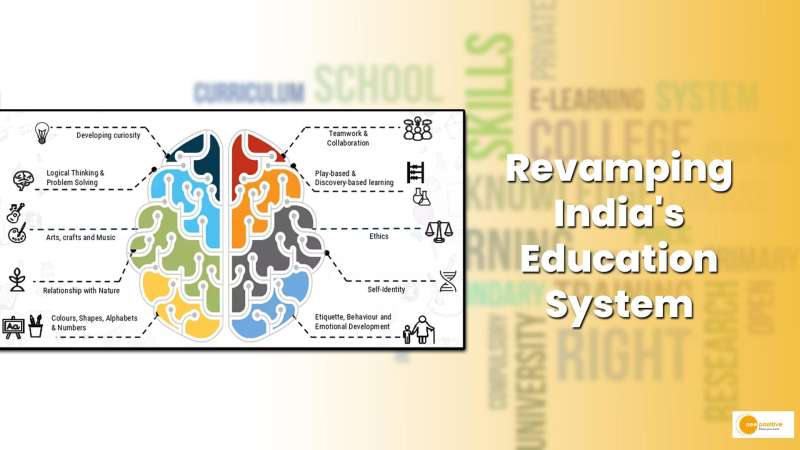

Highlights:
• Board exams to be held twice a year in India.
• No more same 3 streams i.e. science, commerce, arts after 10th.
• Students to appear for a board examination in courses they have completed and feel ready for.
• For CBSE boards, 50% MCQ from 2024 onwards.
India’s education system is set to undergo a major transformation with the proposed National Curriculum Framework (NCF) for School Education. The draft, made public by the education ministry, aims to provide students with a more holistic education by offering them a wider range of choices, doing away with traditional streams, and introducing a semester system for Class 12 students. Let’s delve deeper into the proposed changes.
Farewell to Traditional Streams: Introducing Curricular Areas
Gone are the days of categorizing students into science, commerce, and humanities streams. Instead, the draft proposes the introduction of eight curricular areas that students can choose from. These areas include Humanities, Mathematics and Computing, Vocational Education, Physical Education, Arts, Social Sciences, Sciences, and Interdisciplinary. Within each curricular area, students will have access to multiple disciplines, offering them a wide range of choices.
Flexibility in Choice: The Choice-Based Courses
To complete their Class 12, students will have to complete 16 choice-based courses from at least three curricular areas. Each discipline will have four choice-based courses. Similarly, for Class 10, students will have the same pool of eight curricular areas to choose from. Students will have to complete two essential courses from the eight curricular areas over Classes 9 and 10, amounting to a total of 16 Essential Courses across Classes 9 and 10.
Revolutionizing Board Exams: The Modular Board Examinations
The draft also proposes a semester system for Class 12, where students will have the opportunity to write board exams twice. The final result will be the cumulative result of each of the disciplines that the students chose. The draft suggests the creation of a test bank and other digital tools to move towards a system in which students can take examinations when they wish to. The board examinations should be offered at least twice a year, enabling students to appear for a board examination in courses they have completed and feel ready for.
Curriculum Content: The Three-Language Formula
The higher secondary stage’s curriculum will have 20% local content, 30% regional content, 30% national content, and 20% global content. The draft proposes to continue the three-language formula at the primary level, with students being taught in their mother-tongue or a familiar language. The draft also emphasizes the importance of multilingualism, appreciating diversity, and forming a national identity.
Learning Outcomes: Multiple Narratives and Grooming Confident Beings
The curriculum emphasizes the learning outcomes that should be achieved in each subject at each level. The draft encourages learning content through multiple narratives and emphasizes that the content should lend itself to grooming students into confident beings who can form and express their opinions after considerable research.
Changes in the Weightage and Types of Questions for CBSE boards
The CBSE has made changes in the weightage and types of questions asked in class 10 and 12 board exams. In class 10, 50% of the questions will be competency-based, which includes multiple-choice questions (MCQs), case-based questions, source-based integrated questions, or any other type. The weightage for such questions has been increased from 40% in the last academic session to 50% in the upcoming academic session.
Similarly, in class 12, 40% of the questions will be competency-focused, and the weightage for such questions has been increased from 30% to 40%. The objective questions in both classes will now necessarily be MCQs with a 20% weightage. The weightage for short and long answer type questions has been reduced to 30% from 40% in class 10 and to 40% from 50% in class 12.
NCF Cautions against Predatory Practices of Educational Enterprises
Meanwhile, the National Curriculum Framework (NCF) advises cautious use of information and communication technology (ICT) tools in classrooms. It maintains that digital tools are a supplement and not a replacement for classroom interactions. The draft of the NCF warns against the predatory practices of some educational enterprises. These profit-seeking enterprises prey upon the anxieties of parents and promote ICT-based educational solutions with doubtful efficacy. The NCF emphasizes that ICT use should never be viewed as a replacement for classroom engagement. It should only be seen as a supplement to classroom interactions.
Pre-Primary Students Should Not Be Exposed to Digital Content with Commercial Advertisements
The NCF draft recommends that the use of ICT tools should be avoided at the pre-primary level of learning. Students at this level should not be exposed to any digital content that has commercial advertisements, and all digital content should be used offline. The NCF suggests that ICT tools should be used more to help teachers prepare their content than to help students learn.


